23+ Sample First Apartment Checklist
-
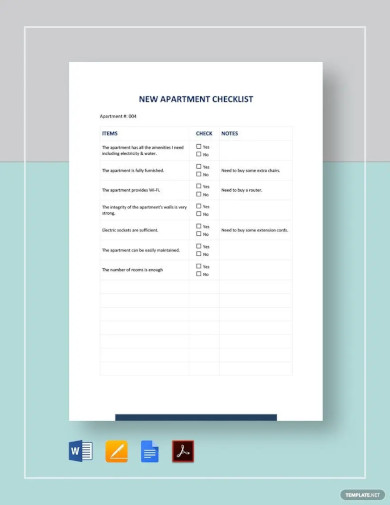
First Apartment Checklist
download now -

FIrst Apartment Cleaning Checklist
download now -
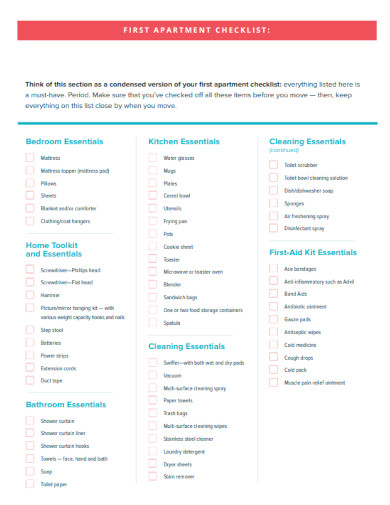
First Apartment Checklist
download now -
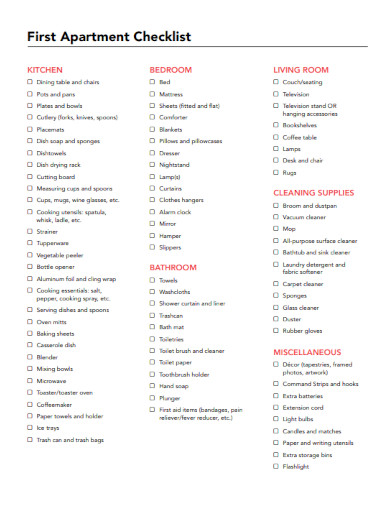
Sample First Apartment Checklist
download now -
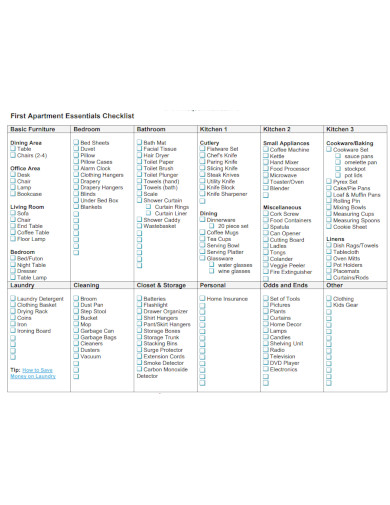
First Apartment Essentials Checklist
download now -
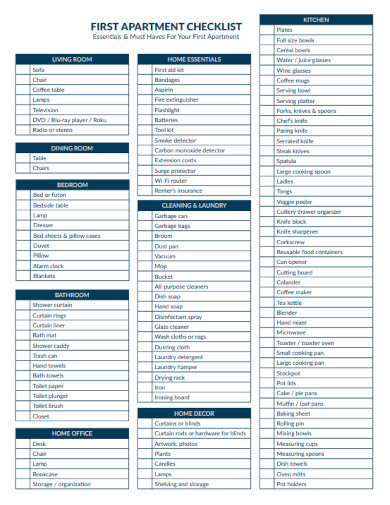
Simple First Apartment Checklist
download now -
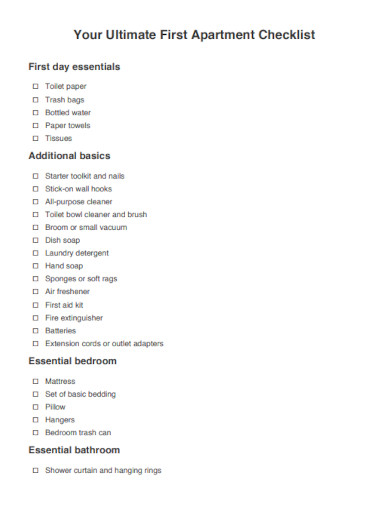
Ultimate First Apartment Checklist
download now -
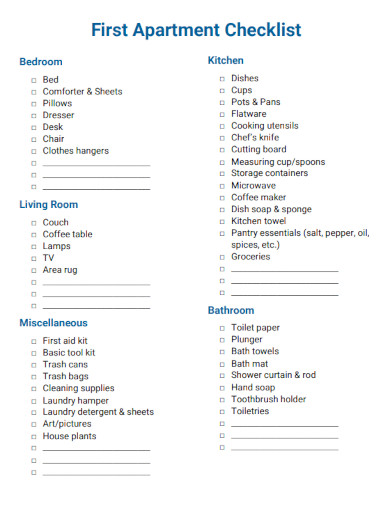
Printable First Apartment Checklist
download now -
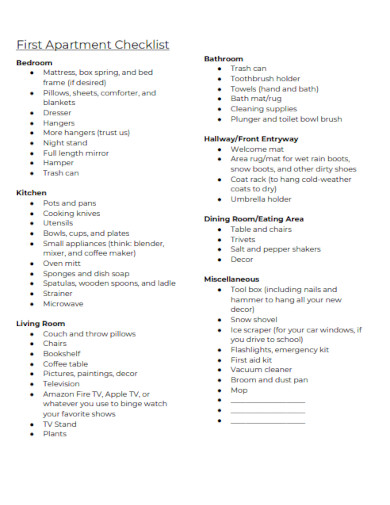
Editable First Apartment Checklist
download now -
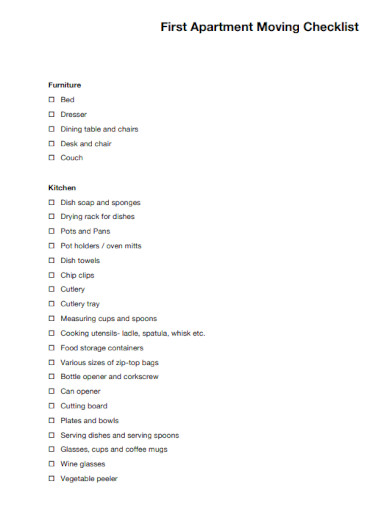
First Apartment Moving Checklist
download now -
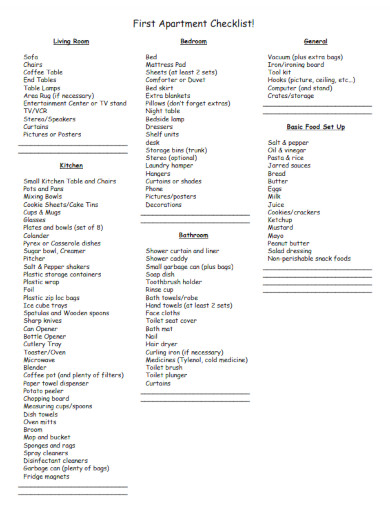
First Apartment Checklist with Kitchen
download now -
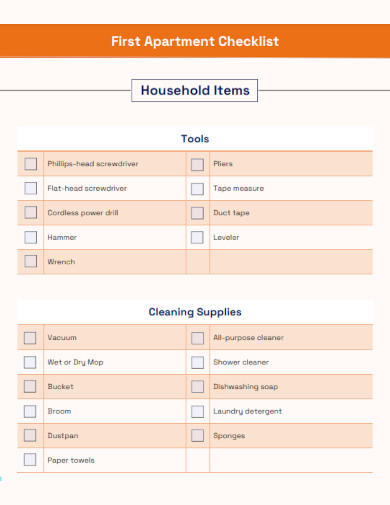
First Apartment Household Items Checklist
download now -
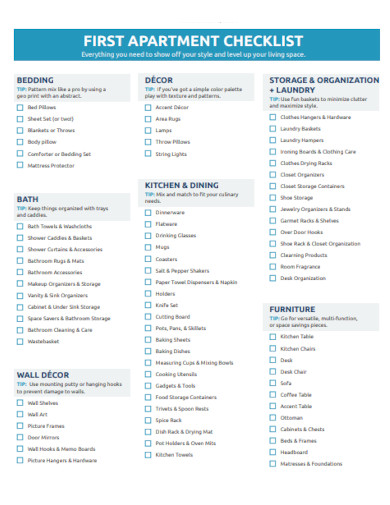
Modern First Apartment Checklist
download now -
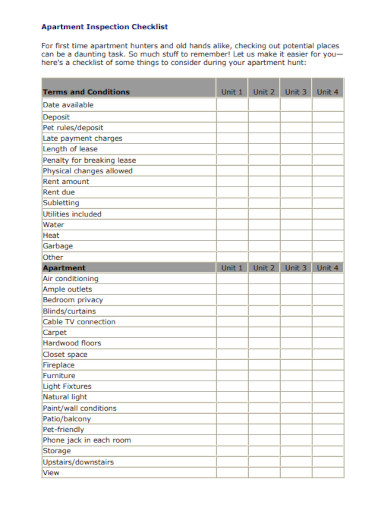
First Apartment Inspection Checklist
download now -
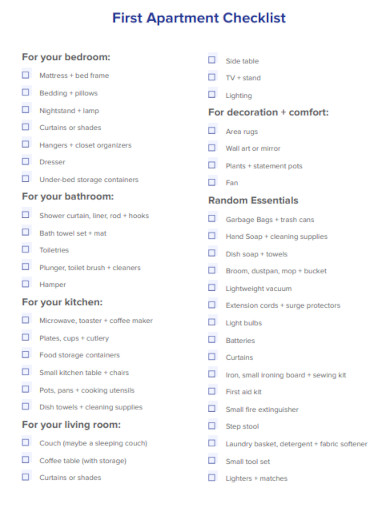
First Apartment Checklist Example
download now -
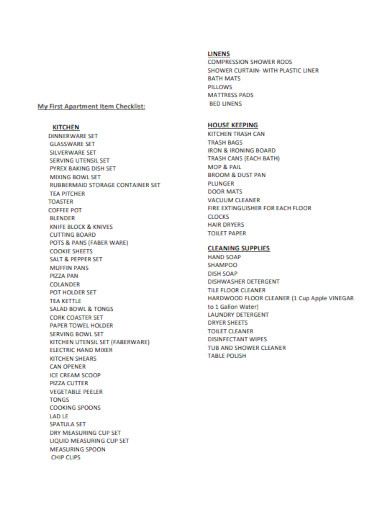
First Apartment Item Checklist
download now -
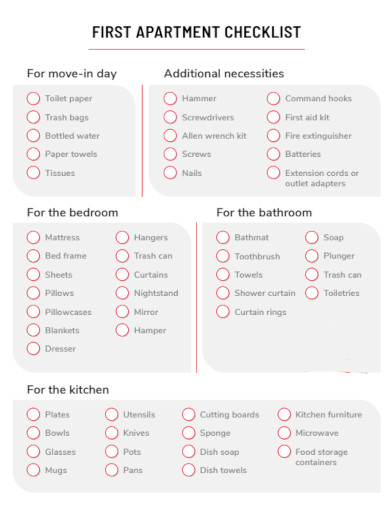
Basic First Apartment Checklist
download now -
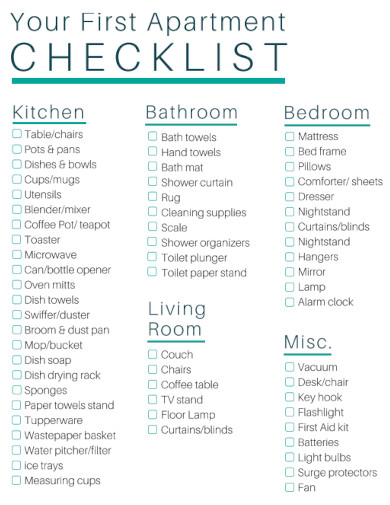
First Family Apartment Checklist
download now -
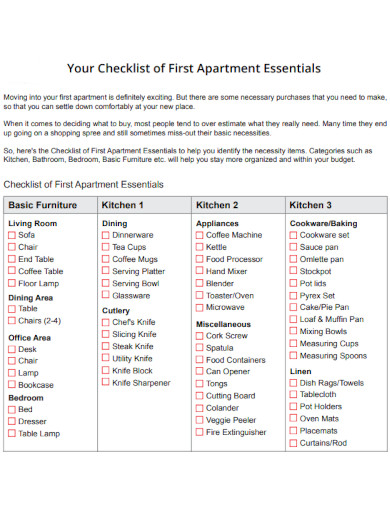
Checklist of First Apartment Essentials
download now -
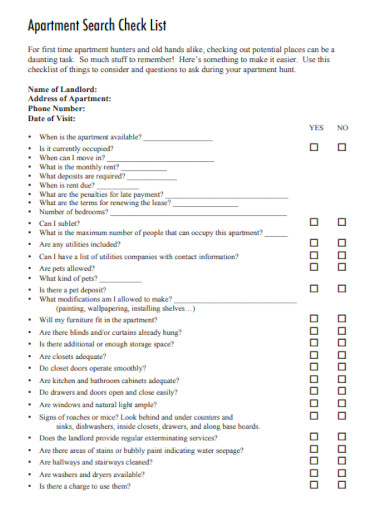
First Apartment Search Checklist
download now -
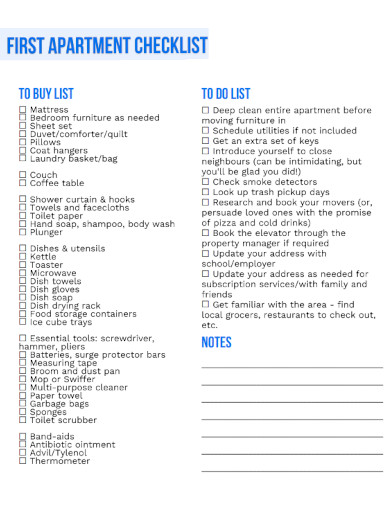
Professional First Apartment Checklist
download now -
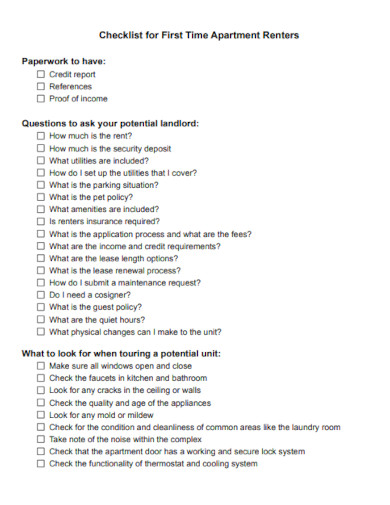
Checklist for First Time Apartment Renters
download now -
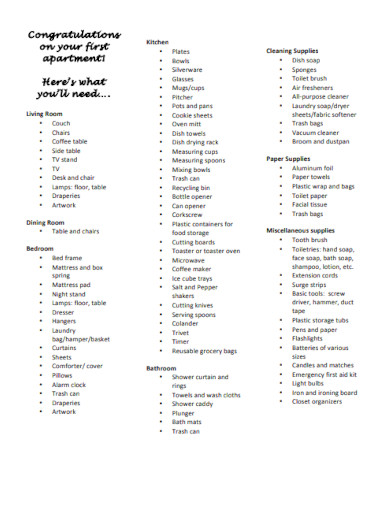
Creative First Apartment Checklist
download now -
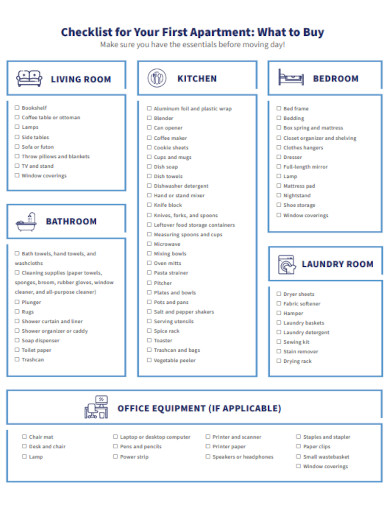
Checklist for Your First Apartment
download now
What Is an Apartment?
An apartment is a residential unit with a door, bathroom, and kitchen. Apartments can also be separate dwellings inside of houses. Within a multifamily or multiunit building, apartments are typically one-story dwellings. The building itself may be classified as commercial property depending on its many units, while the individual units are classified as residential real estate. The maintenance and upkeep of the common areas and repairs to the infrastructure in the separate apartments are often handled by a single owner or management organization for all the units. Even while they can be owned, such as in co-ops or condos, apartments are typically associated with rental homes. The rental lease terms might be as short as a few months or as long as a year, with a year being the most common. Most of the time, residents of apartments have access to communal spaces, including a gym, pool, covered parking, and trash disposal.
Benefits of Living in an Apartment
The debate between apartment and house living has a lengthy history. Nonetheless, with more people renting now than ever in the past 50 years, an increasing number of individuals recognize the benefits of apartment living. When deciding where to live, weighing the advantages and disadvantages is wise. Once you accomplish this, you may discover the overwhelming benefits of apartment living. To help you decide, let’s examine eight reasons you should relocate to an apartment rather than a house.
How to Find Apartments Wisely
Before beginning your apartment search, you should prepare your budget planner, checklist, and queries. Finding the ideal residence can take more work than anticipated. The house of your dreams exists, but you must try to locate it. Your first consideration will be your desired location and ability to afford housing in that area. Also, consider the type of apartment you seek and whether you want to reside with roommates. Numerous factors can influence your search, so we’ve compiled some apartment-hunting advice to help you navigate the process.
1. Plan Your Expenditures
The first thing you should do before apartment searching is create a budget for your apartment expenses. This includes your rent, utilities, grocery list, and expected move-in expenditures. Also, remember any other debts or obligations you may have, such as petrol, parking, phone bill, internet, and credit cards. Limiting rent payments to less than 30 percent of the monthly payroll is customary. This enables you to save money and budget for other monthly expenses. It is essential to note that amenities can increase or decrease the price of an apartment. For instance, it is typically less expensive to reside on the middle floor of an apartment building than on the top or bottom feet. Also, the number of bedrooms and facilities significantly impacts the price, so consider how much space you require and don’t overspend. A home affordability calculator is helpful if you need help determining how much money you can spend. This considers the type of accommodation you desire and determines what you can afford based on your income statement.
2. Think About the Season
Since the weather is better in the summer, most people prefer to migrate during that time. More units are available during these months. However, the cost of apartments rises due to increased demand. Consider moving in the winter when rent is less expensive, and you can negotiate a deal better. Additionally, you should look around any apartment you are viewing to see if there is anything the owner might be trying to hide. First, look for animal droppings within cupboards and above shelves. Verify the precise flow of all showers and sinks as well. Finally, bring a phone charger to check sure the outlets are functional. Check carefully because many of these issues frequently go unnoticed.
3. Don’t Hurry
Be sure to take your time while navigating the complex and unit. When property managers demonstrate their units, they frequently have other tour groups, current tenant issues, and operations to attend to. They may conduct the viewing as quickly as feasible. However, this is their employment application; you can view the apartment for as long as you like. Utilize a portion of their time to communicate with them by talking about yourself and asking questions that will help them recall you. This may increase the likelihood that they choose your application over another.
4. Make a Checklist
People who are apartment hunting become overwhelmed and must remember to check the locations and items they had prioritized. Try compiling an organized list of your apartment’s wants and requirements. As you complete your tours, you can check off your list and use the information to construct a list of pros and cons that will help you make your final decision. Also, some apartment complexes and real estate agencies are notorious for unethical conduct. Most people are very vocal online when they discover something they like or dislike. Before your tour, be sure to Google, the company and read reviews to acquire background information.
5. Find the Best Contact
Most listings will always provide a general contact point for those intrigued. However, if you are serious about the listing and wish to move swiftly, you should utilize the listed contact information. Frequently, there will also be the phone number of the individual showing the apartment, which you can call directly. If there is room for negotiation, you should attempt to negotiate the rent. When the unit has numerous issues that must be rectified, it’s an excellent time to negotiate prices. You can also intervene if the building or unit does not include the desired amenities. If you secure a lease, the property manager may be willing to sacrifice a portion of the monthly rent.
6. Think About Your Willingness to Make Concessions
Finding the ideal house that meets all of your requirements might be challenging. There will probably be some giving up and giving in. You can have diverse ideas of what you want in an apartment, whether you are looking for friends or, more specifically, a partner. Ultimately, knowing when to make concessions to sign a lease and satisfy your spouse is usually better.
FAQs
Which floor is the most expensive in an apartment?
The apartments on upper floors are typically more expensive than those on lower floors for three reasons, which can be categorized as follows: practicality, security, and prestige. The apartments on the upper floors share natural light and fresh air due to their spatial arrangement.
Is the apartment safe or not?
Yes, apartments are typically safer than houses in residential security. More people are around to spot a burglar in high-density apartments than in single-family homes, and entrances may not be readily accessible.
What is the correct order of cleaning?
You should clean surfaces before sanitizing them. Most bacteria on surfaces and objects are killed by disinfection. Stronger bleach solutions or other chemicals are used for disinfecting. Before you disinfect surfaces, clean them.
Finding the perfect home can take much time and effort, but it is worthwhile. So much time is spent dealing with accommodation difficulties. Now that you know these apartment-hunting strategies, you should feel confident to begin your search without hesitation.
